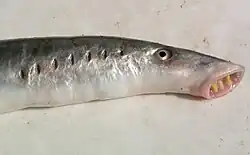agnathan
English

Agnathans, such as this lamprey, are distinguished by the lack of a jaw.
Etymology
From Agnatha, from Ancient Greek ἀ- (a-, “without”) + γνάθος (gnáthos, “jaw”).
Pronunciation
- enPR: ăgʹnə-thən, ăg-năthʹən
- IPA(key): /ˈæɡ.nə.θən/, /æɡˈnæθ.ən/
Adjective
agnathan (not comparable)
- (zoology) Belonging or pertaining to the superclass Agnatha, the jawless vertebrates.
- 2005, Tim Haines, Paul Chambers, The Complete Guide to Prehistoric Life, BBC Books, page 20:
- Haikouichthys is one of three species of jawless (or agnathan) fish to be found in the Early Cambrian period.
Noun
agnathan (plural agnathans)
- (zoology) A member of the superclass Agnatha of jawless vertebrates.
- 1956, D. R. Newth, “On the Neural Crest of the Lamprey Embryo”, in Journal of Embryology and Experimental Morphology, volume 4, page 358:
- Thus should the cranial neural crest in cyclostomes prove to be non-skeletogenous this might be a reflection either of its own primitiveness or of the different evolutionary origins and morphological status of the visceral skeleton in agnathans and gnathostomes.
- 1992, Peter J. Hanley et al., “Hagfish Humoral Defense Protein Exhibits Structural and Functional Homology with Mammalian Complement Components”, in Proceedings of the National Academy of Sciences, volume 89, page 7910:
- The hagfish is an agnathan, a modern representative of the earliest evolved group of vertebrates, the ostracoderms or jawless fishes, which arose prior to the ancient placoderms (3).
Hypernyms
Hyponyms
Coordinate terms
Translations
member of the superclass Agnatha of jawless vertebrates
|
This article is issued from Wiktionary. The text is licensed under Creative Commons - Attribution - Sharealike. Additional terms may apply for the media files.